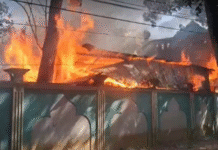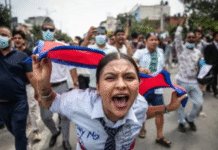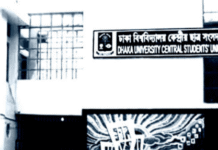From now on, the government will recognise Dawra degree of Qawmi madrasa as equivalent to master’s degree, a move that has raised many eyebrows.
Prime Minister Sheikh Hasina made the announcement last night at a meeting with some 350 representatives of Qawmi madrasas at the Gono Bhaban.
Hefajat-e Islam chief Shah Ahmed Shafi, also chairman of Qawmi Madrasa Education Board, led the group.
The decision means the Dawra-e-Hadith degree holders will be seen as having master’s degree in Islamic Studies or Arabic and can apply for jobs meant for master’s degree holders.
However, the government will not recognise certificates of any other level as the Qawmi madrasa representatives do not want such recognition now.
“I’m announcing that keeping the unique characteristics of Qawmi madrasa and based on the basic principles of Darul Ulum Deobandh, the certificates of Dawra-e-Hadith of Qawmi madrasa has been given the status of master’s in Islamic Studies and in Arabic,” UNB quoted the PM as telling the meeting.
Pointing out that there are many criticisms and harsh comments by many people of other countries about Qawmi madrasa, Hasina said, “But, I always protested this and I always felt that the government needs to give recognition to Qawmi education.”
Professor Emeritus Serajul Islam Choudhury said the government decision to recognise the degree without improving the syllabus and curriculum was unexpected.
“The quality of their education has not improved and nobody knows the contents of their textbooks. Without improving the curriculum, this degree will not help them much in the job market either because they don’t get proper education. Their education system is not comparable with the mainstream education,” he told The Daily Star last night.
Asked, Maulana Farid Uddin Masuod, a key figure in the Qawmi education system, claimed the standard of Dawra degree was superior to even the master’s degree in Islamic Studies offered by Dhaka University.
“A huge number of madrasa students of Bangladesh have long been deprived of this right. Today, they got their rights through the announcement,” Maulana Farid, also co-chairman of Bangladesh Qawmi Madrasa Education Commission, told this newspaper.
The government will soon issue a circular to make the PM’s announcement effective. Later, it will formulate a law, he added.
Contacted, Education Minister Nurul Islam Nahid said now that Hasina made the decision, the ministry would follow the due process for its implementation.
“A circular would be issued and a law would be made, if required,” said Nahid, who was present at the meeting along with Home Minister Asaduzzaman Khan Kamal and Roads and Bridges Minister Obaidul Quader.
The primary decision to this effect came at a meeting at the education ministry on March 28. At the meeting, ministry officials said the government would gradually start recognising Qawmi madrasa certificates from elementary level. But the madrasa authorities pressed that the government recognise Dawra certificate first to help madrasa students get jobs.
Finally, the ministry accepted the proposals of the Qawmi madrasa authorities, backed by Chittagong-based Islamist group Hefajat-e Islam, sources said.
According to their proposals, a committee with representatives from the six existing Qawmi madrasa boards will issue the certificate. There will be no government representatives on the committee.
The government had proposed that state-run Islamic Arabic University or Islami University issue the certificate, but the madrasa leaders rejected it, according to the sources.
The country’s madrasa system is divided into two categories — Alia and Qawmi. Alia madrasas, all registered with and supervised by Bangladesh Madrasa Education Board, offer a distinctive combination of modern and religious education.
Qawmi madrasas, on the other hand, have so far been an uncharted territory with no government monitoring, supervision or support. They run with private donations mostly.
Currently, some 14 lakh students study in about 14,000 Qawmi madrasas, according to last year’s report of Bangladesh Bureau of Educational Information and Statistics.
These madrasas operate under six boards namely Bangladesh Qawmi Madrasa Education Boards or Befaqul Madarisil Arabia Bangladesh. They are said to follow the syllabus of Darul Uloom Deoband, a historic Islamic school of India, focusing mainly on Arabic, Persian and Urdu languages.
It is understood they don’t teach science, social science, maths and literature. Only a handful of Qawmi madrasas teach Bangla and English up to class eight.
The issue of recognising Qawmi madrasa education first came to the forefront during the BNP-Jamaat-led government’s tenure.
On August 21, 2006, just three months before leaving office, the then PM Khaleda Zia said the government decided to recognise Dawra certificates. However, the decision could not be implemented because the required process could not be completed by the time the BNP left office.
But a section of Qawmi madrasa teachers and Islamic thinkers kept up the pressure.
In the face of their demand, the Awami League-led grand alliance government took an initiative to recognise Qawmi madrasas and reform their education system.
On April 15, 2012, the education ministry formed a 17-member commission comprised of Qawmi scholars, with Shah Ahmed Shafi in the chair, to improve Qawmi education and provide students with knowledge and skills needed for the job market. Farid Uddin Masuod was co-chair of the commission.
On April 13 the next year, the commission submitted a draft policy, outlining the curriculum, evaluation system and six tiers of Qawmi education.
It also proposed introducing certificates for each tier — primary, junior secondary, SSC, HSC, honours and master’s — and a syllabus, including Bangla, English, mathematics and social science up to at least the higher secondary level.
Based on the draft policy, the education ministry had prepared a proposal to make a law to set up a body — Qawmi Madrasa Education Authority — with government representatives and experts in it.
The proposal was scheduled to be placed at the cabinet meeting on October 28, 2013, for approval.
But on October 27, Hefajat chief Shafi, also director general of Hathazari Darul Uloom Madrasa, called a press conference in Chittagong and warned of a “civil war” should the government try to “control” Qawmi madrasas.
Following the threat, the education ministry backed away from placing the draft before the cabinet.
Sources in the ministry said the government had shelved the initiative to keep the Islamist group from waging any street demonstration.
However, the education ministry later revived the plan. On September 27 last year, it formed a committee headed by Farid Uddin Masuod to find ways to recognise certificates of Qawmi madrasas. But the ministry faced opposition from Hefajat again.
Later, the government issued a circular reviving the commission led by Shafi. The commission was asked to come up with ways to recognise the certificates. In line with their suggestions, the government then proceeded to recognise the Qawmi madrasa certificates.
Source: The Daily Star









